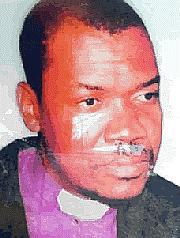 Three Christian pastors (and by one report nine laymen) were beheaded by the Nigerian Islamic group Boko Haram (literally "Western or non-Islamic education is a sin"). The three martyred pastors have been identified as George Orjih (pictured), Sabo Yakubu and Sylvester Akpan.
Three Christian pastors (and by one report nine laymen) were beheaded by the Nigerian Islamic group Boko Haram (literally "Western or non-Islamic education is a sin"). The three martyred pastors have been identified as George Orjih (pictured), Sabo Yakubu and Sylvester Akpan.
According to The Sun News:
Corroborating the account of the killing, a Senior pastor with Good News Church, Wulari Maiduguri Rev. Baba Gata Ibrahim told Daily Sun in an interview that a pastor in his church, Pastor George Orjih was beheaded on the instruction of the Boko Haram leader because the clergy man refused to accept Islam.
“An eye witness who was also captured by the Islamic militants gave us details of how the pastor was killed. He told us they were persuading him to accept Islam and he said over his dead body. He was even said to have preached Christ to Mohammed Yusuf and that reportedly angered the sect leader who then as he ordered that the pastor and others be killed immediately,” he disclosed.
World reports the brutality of the attack.
On 26 July, the girl identified by CSW only as Mary was in church with her pastor, his brother and an older Christian woman when a group of fifty militants broke in. She and her pastor hid as the group killed the pastor’s brother and dragged the older woman out of the room. On discovering their hiding place, the militants cut off her pastor’s hand to stop him holding on to her, then hacked him to death with machetes before setting him on fire.
The girl and the woman were dragged to Boko Haram's compound in Maiduguri's Railway district, and were placed in a room with around 100 other Christian women and girls. They were all asked to renounce their faith or face continued imprisonment, while Christian men were given the choice of renouncing their faith or dying.
Mary vividly describes how she was forced to wash the blood stained clothing of Boko Haram fighters. She was in the camp for four days, but managed to escape with a few others when military forces intensified their attack on the compound.
The Examiner gives some background on the recent violence in Nigeria:
Most Westerners were unaware of the violence that erupted in northern Nigeria during the month of July. Under orders from their leader Muhammad Yusuf, members of the extremist Muslim group known as Boko Haram brought a reign of terror down on the people of the region, murdering people for not adopting their form of Islam. They even went so far as publicly executing Christian ministers in the Nigerian city of Maiduguri before they were finally stopped by Nigerian forces.
The Boko Haram moved into the Borno province of Nigeria earlier this month, but the Nigerian government did little to stem the violence for most of the month. Government troops finally arrived in Maiduguri, the capital of Borno province, on July 28. By then, the Boko Haram had killed at least 700 people.
... Boko Haram is analogous to a Nigerian Taliban, forbidding knowledge of anything Western and enforcing Sharia law wherever they go. They are based in Chad, crossing the border into Nigeria whenever opportunity presents itself.
Although a number of Christian groups have raised protests about the incidents, it has gone largely unnoticed by the mainline media.
Rev. George Orji was pastor of Good News of Christ Church International, Inc.
The late Pastor George Orjih was said to have arrived Maiduguri a day before the insurgence from Jos, where he was doing his master’s degree programme in Theology. Described as fearless, hardworking, ambitious and intellectually sound, his care for the welfare and well-being of his family and a widow in the neighbourhood, which he attempted to rescue from the troubled area allegedly contributed to his capture and eventual death.
“He was mindful of his family and their welfare. He was really out of house at first but thought to go back and pick something for his family. That was how he was captured by the Boko Haram before he was killed,” Rev Gata Ibrahim explained.
Sylvester Akpan was pastor of National Evangelical Mission. Sabo Yakubu was pastor of Church of Christ in Nigeria (COCIN).
[D]elivering a sermon during the funeral rites for late Rev. Sabo Yakubu, slain COCIN Church pastor, the speaker, Rev Bulus Azi urged Christians to emulate the pastors who were killed because of their refusal to betray their faith. Quoting from the bible in Revelation 7:9-15, the regional chairman of the church told Christians to prepare to die anytime as their calling demand.
Photo credit: The Sun Publishing
 The Iranian Christian news agency Mohabat News recently published a list of Christians imprisoned in Iran. The list, which was current as of February 2012, consists of prisoners known by and confirmed by Mohabat News.
The Iranian Christian news agency Mohabat News recently published a list of Christians imprisoned in Iran. The list, which was current as of February 2012, consists of prisoners known by and confirmed by Mohabat News. 


